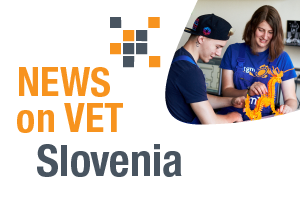In March 2023, the Association of Slovenian Educationalists (ZDPDS) organised a conference in Ljubljana titled ‘Is Slovenia in need of a new education reform?’, which opened a public discussion on the methodology and scope of the education reform currently in preparation.
Renowned experts active at all levels of education shared their reflections expressing their opinion on which systemic and curricular changes should be implemented.
Klara Skubic Ermenc, PhD and Danijela Makovec Radovan, PhD from the Faculty of Arts, University of Ljubljana, reflected on core objectives and principles of VET, claiming that in its conception the VET system was initially based on national analyses and comparative research. After joining the EU, development measures were largely facilitated and financed by the EU institutions, but did not always align with the national context and could not always be optimally integrated into the national system. The experts highlighted three core challenges of VET which should be addressed as tasks in the forthcoming reform.
- The preparation of students for a profession as a core task of VET has weakened, especially in technical VET programmes. The crucial role of social partners in VET has never reached its full potential, their formal role outweighing their actual impact. This issue should be reconsidered, and new approaches should be proposed.
- Regarding preparation for further education, VET is very successful. However, restrictions on tertiary education enrolment tend to hinder permeability.
- The social integration role of VET is becoming more and more important due to the diversity of social identities represented in VET schools. Individualised learning pathways, tailored approaches and support, career guidance and advanced counselling services are becoming a necessity. To achieve this, teachers and in-company mentors need to be suitably trained.
The experts presented one of the outcomes from a workshop held in 2022 by the Institute of the Republic of Slovenia for VET (CPI) on possible scenarios for the development of VET until 2040. The workshop highlighted the idea of ‘inclusive excellence’, which refers to the merging of excellence and professionalism with inclusivity in systems and schools, creating this way a diverse VET system, which welcomes students of all ages, enrolled in formal or non-formal, initial or continuous VET. The focus would be on work-based learning and on developing students’ talents and abilities, including SEN students. Schools, chambers, companies and trade unions would use their human and financial resources to co-create actively VET programmes and establish conditions conducive to high-quality implementation.
The conference concluded with a round table, which brought together key stakeholders of the reform, such as the minister responsible for education, Darjo Felda, PhD.; the Dean of the Pedagogical Faculty in Ljubljana, Janez Vogrinc, PhD; the Director of the National Education Institute, Vinko Logaj, PhD; the Director of the CPI, Janez Damjan, MSc; the Director of the Slovenian Institute for Adult Education, Nataša Potočnik, PhD; and the Director of the School Centre in Ljubljana, Nives Počkar.
As a next step, the Association of Slovenian Educationalists has issued a call for the professional public to contribute to discussions, and share insights and experiences in the next issue of the Journal of Contemporary Educational Study. This issue will focus on the topic of reforming the education system.
Read more
- CPI article on the education reform
- Association of Slovenian Educationalists
- Invitation to the expert consultation of the ZDPDS on the new reform in education: Is Slovenia in need of a new education reform?
- Journal of Contemporary educational study
|
Please cite this news item as: ReferNet Slovenia; Cedefop (2023). Towards an educational reform. National news on VET |
